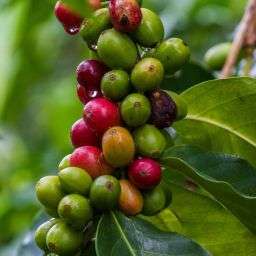
Fair Trade Organic Coffee stands at the intersection of ethical consumption and sustainable agriculture, embodying a commitment to environmental stewardship and social responsibility. This coffee is distinguished not only by its organic cultivation, free from synthetic fertilizers and pesticides, but also by its adherence to Fair Trade principles.
These principles ensure that coffee farmers receive a fair price for their crops, thus promoting equitable trading conditions. The significance of Fair Trade Organic Coffee extends beyond the cup; it contributes to sustainable production practices that benefit both the planet and the people who cultivate the coffee beans.
Key Takeaways
- Fair Pricing and Sustainable Production: Fair Trade certification guarantees coffee farmers a minimum price for their produce, offering them financial stability and the ability to invest in sustainable farming practices. This model not only aids in improving their living conditions but also supports the broader goal of sustainable agricultural development.
- Environmental Health Through Organic Practices: The organic certification of coffee signifies a commitment to cultivating coffee without harmful synthetic inputs. This approach reduces environmental pollution, enhances soil health, and preserves biodiversity, aligning with global efforts to combat climate change.
- Community Development and Market Stability: By supporting Fair Trade Organic Coffee, consumers contribute to the welfare of coffee-growing communities. The Fair Trade model provides a premium that communities can use to fund vital projects, including education, healthcare, and infrastructure improvements, thereby fostering community resilience in the face of market volatility.
- Ethical Consumerism and Industry Critiques: While Fair Trade Organic Coffee advances the cause of ethical consumerism, it is not without its critiques. Some argue that the Fair Trade system could do more to incentivize quality improvement and address the complex dynamics of global coffee trade. These criticisms highlight the ongoing need for dialogue and innovation within the Fair Trade movement to ensure it continues to meet its goals of equity and sustainability in coffee production.
Criteria and Standards for Certification
Fair Trade certification for coffee is governed by a set of stringent criteria and standards designed to support sustainable development and equitable trade practices. At its core, Fair Trade certification aims to ensure that coffee farmers receive a fair price for their harvest, thereby providing them with financial stability and the means to invest in their communities and sustainable farming methods.
To be Fair Trade certified, coffee producers must meet various social, economic, and environmental standards. These standards include fair labor practices, such as prohibiting child labor and ensuring safe working conditions, environmental stewardship, such as sustainable farming practices and biodiversity conservation, and direct trade relationships that facilitate greater equity in the international trading system.
Impact on Coffee Farming Communities
The role of Fair Trade organizations is pivotal in transforming the lives of coffee farming communities. By advocating for fair prices, these organizations help to ensure that farmers receive a living wage for their produce. Furthermore, the Fair Trade premium—additional money paid on top of the agreed Fair Trade price—allows communities to invest in critical infrastructure, such as schools, healthcare facilities, and clean water projects.
These investments not only improve the quality of life for the farmers and their families but also promote long-term sustainability and resilience against economic fluctuations. Fair Trade organizations also play a crucial role in empowering farmers through education and training, enabling them to improve their farming practices, increase the quality of their coffee, and become more competitive in the global market.
Requirements for Organic Coffee Production
Organic coffee production is regulated by specific requirements that prioritize environmental conservation and health. To be certified organic, coffee must be grown without the use of synthetic pesticides, herbicides, and fertilizers.
This necessitates the adoption of natural agricultural methods, such as using organic compost for fertilization, employing biological pest control, and practicing crop rotation to maintain soil health. Organic certification also entails strict guidelines on the processing of coffee beans to prevent contamination with non-organic substances, ensuring that the coffee remains pure and chemical-free from farm to cup.
Environmental and Health Benefits
The shift towards organic coffee production has significant environmental and health benefits. By eliminating synthetic chemicals, organic farming reduces pollution and preserves water quality, contributing to the conservation of vital ecosystems. Organic practices also enhance soil fertility and biodiversity, creating a healthier environment for coffee plants and the wildlife that inhabit coffee-growing regions.
For consumers, organic coffee offers a healthier alternative, free from chemical residues that could pose health risks. Additionally, the rich biodiversity in organic coffee farms supports a wider range of plant and animal species, contributing to the overall health of the planet.
Economic Benefits for Farmers
Fair Trade practices serve as a cornerstone for ensuring economic stability and growth for coffee farmers. By setting a minimum price for coffee, Fair Trade initiatives protect producers from the volatile swings in the global market. This minimum price acts as a safety net, ensuring farmers can cover their costs of sustainable production even when market prices fall below a sustainable level.
Additionally, Fair Trade introduces a premium on top of the selling price, which is directed towards community projects. This premium is a critical source of funding for infrastructure improvements, education, and healthcare services within coffee-growing communities.
The economic impact of Fair Trade on these communities is profound. With the guarantee of a fair price and the additional premium for community projects, farmers are empowered to invest in their operations and improve productivity. This financial stability encourages a more sustainable approach to farming, as producers can afford to implement better practices without the immediate pressure of market forces. Moreover, the investment in community projects leads to broader social benefits, including improved education, healthcare access, and overall quality of life for coffee producers and their families.
Environmental Sustainability
Organic farming practices endorsed by the Fair Trade system are pivotal in promoting environmental sustainability. These practices include the prohibition of synthetic pesticides and fertilizers, conservation of water resources, and preservation of biodiversity. By adhering to organic standards, Fair Trade coffee farms help maintain healthy ecosystems, which are crucial for sustainable coffee production and the well-being of surrounding communities.
Fair Trade also plays a significant role in reducing the carbon footprint associated with coffee production. Sustainable farming practices encouraged by Fair Trade, such as shade-grown coffee, not only conserve biodiversity but also store carbon, mitigating the effects of climate change.
Through the promotion of organic practices and responsible land management, Fair Trade contributes to a decrease in greenhouse gas emissions and encourages a more sustainable use of natural resources. This holistic approach ensures that coffee production can be both environmentally responsible and economically viable for future generations.
Social Impacts
The social benefits of Fair Trade Organic Coffee farming are transformative, extending far beyond the coffee fields to uplift entire communities. Enhanced healthcare access emerges as a cornerstone benefit, with Fair Trade premiums often allocated towards health clinics and services. Education sees a similar uplift, with investments facilitating better school infrastructure and scholarships. This emphasis on education and healthcare is pivotal for long-term community development.
Gender equality is another critical area positively impacted by Fair Trade practices. By encouraging women’s participation in cooperative leadership and ensuring equal pay for equal work, Fair Trade helps to break down traditional barriers, empowering women within coffee-producing communities.
Furthermore, Fair Trade certification plays a vital role in combating child labor and promoting workers’ rights. By adhering to strict standards that prohibit child labor and enforce safe working conditions, Fair Trade ensures that coffee production is ethical and socially responsible, laying the groundwork for a brighter future for all community members.
FAQs
- Is all Fair Trade Coffee organic? Not necessarily. While many Fair Trade coffees are also organic, the two certifications have distinct criteria. Organic certification focuses on production methods, whereas Fair Trade certification centers on labor practices and fair payment.
- How does Fair Trade benefit the consumer? Fair Trade offers consumers the assurance that their coffee purchases support ethical labor practices and contribute to the sustainability of coffee-growing communities.
- Can Fair Trade Organic Coffee improve farmers’ livelihoods sustainably? Yes, by ensuring a minimum price for coffee and providing premiums for community projects, Fair Trade Organic Coffee can lead to sustainable improvements in farmers’ livelihoods.
- What are the challenges facing Fair Trade Coffee production? Challenges include the need for greater consumer awareness, ensuring certification processes are accessible for small farmers, and balancing market demand with sustainable practices.
Final Thoughts
Supporting Fair Trade Organic Coffee is not just about enjoying a high-quality cup of joe; it’s a conscious choice that contributes to a more equitable and sustainable world. By choosing Fair Trade Organic Coffee, consumers have the power to influence the industry, encouraging ethical labor practices, environmental sustainability, and the well-being of coffee farming communities.
As awareness grows and demand for ethically produced coffee increases, we can all play a part in fostering a brighter future for the coffee industry and its invaluable producers.








